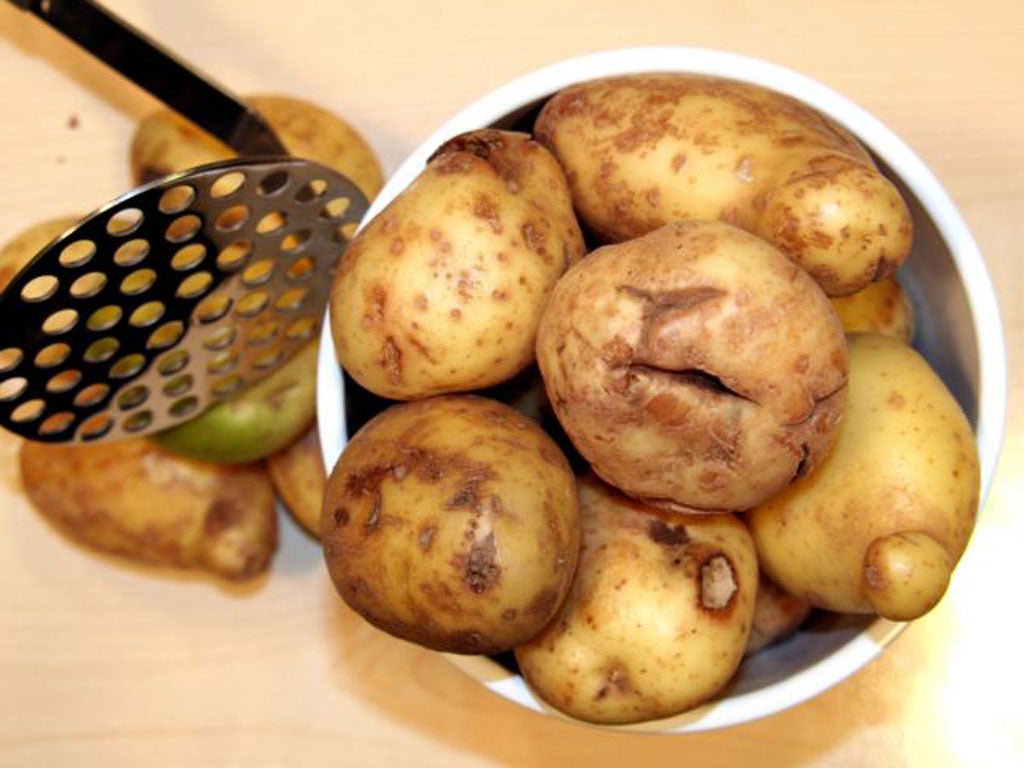Strange fruit: How Britain's soggy summer left its mark
Worst harvest in a generation has forced supermarkets to lower their standards

Your support helps us to tell the story
From reproductive rights to climate change to Big Tech, The Independent is on the ground when the story is developing. Whether it's investigating the financials of Elon Musk's pro-Trump PAC or producing our latest documentary, 'The A Word', which shines a light on the American women fighting for reproductive rights, we know how important it is to parse out the facts from the messaging.
At such a critical moment in US history, we need reporters on the ground. Your donation allows us to keep sending journalists to speak to both sides of the story.
The Independent is trusted by Americans across the entire political spectrum. And unlike many other quality news outlets, we choose not to lock Americans out of our reporting and analysis with paywalls. We believe quality journalism should be available to everyone, paid for by those who can afford it.
Your support makes all the difference.Britain's soaking wet spring and lacklustre summer may be over – but they have left a legacy on our supermarket shelves: ugly fruit and vegetables.
The worst harvest in a generation, a result of wet weather in spring and a cold, cloudy summer, has forced sellers to drastically lower their standards on fresh products' cosmetic appearance – resulting in cracked potatoes, blemished apples and undersize carrots being sold in Britain's major supermarkets.
With the yield of apples down by nearly a third and losses of about 20 per cent for some of the country's key field vegetables, retailers have been forced to buy misshapen, discoloured and undersized products to keep their shelves stocked.
Sainsbury's announced this week that it would "radically change" its approach to buying British fresh produce this year, while Asda have pledged to "flex specifications" to allow less aesthetically-pleasing fruit and vegetables onto the shelves. Morrisons and Waitrose have said they may also broaden their intake. Supermarkets insist there will be no change in the taste of fresh produce.
The moves have been welcomed by British growers, many of whom had feared ruin at the hands of what growers say is the worst harvest since 1965.
"Spring and early summer was characterised by wetness and a lack of sunlight which is a perfect storm for a growing plant that needs to establish itself in the soil," said James Hallett, chief executive of the British Growers Association. "A lot of crops struggled to get started. As the season progressed we never saw the sun come out for long enough to get growth going. A lot of crops haven't matured and the ones that have are small."
Growers predict that the field vegetable yield – products such as onions potatoes, carrots and parsnips – could be down by as much as a fifth by the end of the harvest.
Most misshapen produce will be available in supermarkets' budget ranges. Tesco's Everyday Value range already sells "variations" on the standard shapes and sizes.
Sainsbury's will this week be trialling cracked potatoes in 35 stores in the Midlands. Potato skins become cracked when a season of slow growth is punctuated by brief spells of sunshine and rapid growth.
"We want to make the most of the British produce we have by telling customers that regardless of looks, their fruit and veg from Sainsbury's is still of the same quality and value they expect. Beauty is only skin deep," a spokesman said.
The period from April to June was the wettest in the UK since records began. Apple crops are down by nearly a third and many shops, including Sainsbury's, will now stock russeted – or blemished – apples. Adrian Barlow, chief executive of growers' association Apples and Pears claimed that despite being ugly, this year's crop was actually more flavoursome.
The economic impact of the poor harvest on Britain's fruit and vegetable industry has been softened by the supermarkets' decision to stock "ugly" produce, but many growers have been forced to make staff redundant.
One West Country grower had seen his income drop from £1.6m to £160,000, Mr Barlow said. Growers warn that with the autumn's continued wet weather, next year's harvest could be even worse.
Join our commenting forum
Join thought-provoking conversations, follow other Independent readers and see their replies
Comments